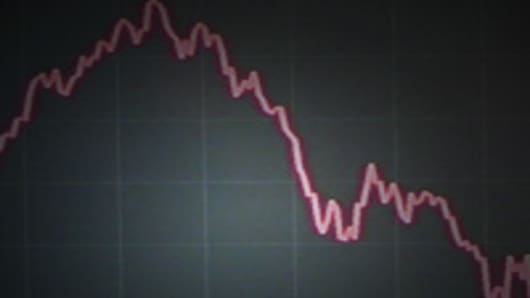With growth slowing across most major markets, one well-known stock market bear is predicting big losses for stocks in the third quarter, despite the chance of further central bank action to help shore up confidence.
“Over the August to November period I am looking for the S&P 500 to trade off down from around 1400 to 1100/1000—in other words, I expect over the next four months to see global equity markets fall by 20% to 25% from current levels and to trade at or below the lows of 2011,” Bob Janjuah, co-head of global macro research and head of tactical asset allocation at Nomura, wrote in a research note.
Janjuah’s last big call was for a 10 percent sell-off in equitiesduring the second quarter. While all major indices in the developed world finished the period down for the three months, most didn’t fall by as much as he predicted.
Following weak economic datafrom major markets like the U.S. and Europe, Janjuah believes the majority of analyst expectations on growth are overly optimistic. “The growth weakness is driven by a shortfall in true end global demand, and in particular we still think the consensus is most off-target in its still too bullish growth expectations for the US and the EM/BRICs complex,” he wrote.
Expectations of central bank intervention are currently high in the market, with reports indicating both the ECB (for an explanation click here) and Fed (for an explanation click here) are considering further monetary easing, but Janjuah argued the consensus is too optimistic, both in terms of the likelihood of more action and the impact any action might then have.
“We think that the period August through to November represents a major global policy and political vacuum. In the euro zone the political ‘impasse’ and the restrictions on policy are well known and central to the problem. But also in the US, the election cycleto us means no major policy initiative is likely from either Washington or the Fed until later in November at best,” Janjuah wrote.
“And in China, the leadership changes to us suggest only very minor policy inputs/assistance, most likely until the very back-end of 2012 or possibly not until March 2013.”
The euro zone remains the markets’ major worry, and Janjuah does not think there will be a solution in the near term.
“I think full fiscal and political union is the only credible answer, but this is unlikely to happen smoothly nor anytime soon. We may be talking years, but certainly many quarters” said Janjuah, who believes the only credible policy response would be full, unlimited quantitative easing by the ECB.
“I think unbounded ECB QE is an almost certain event, but not until the euro zone inflationdata are deeply and meaningfully and consistently deflationary,” said Janjuah.
—By CNBC EMEA Head of News, Patrick Allen



